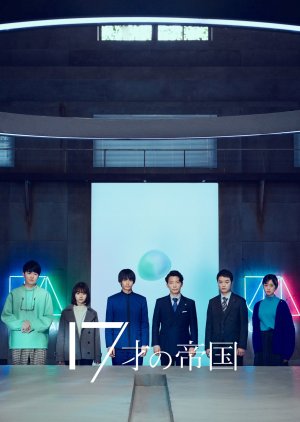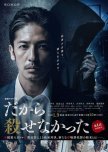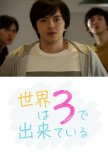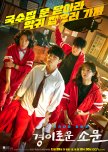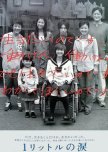
Hidden Gem Jdrama in 2022
Five episodes only but it was really well written. Love the concept that they're trying to bring out. Therefore, its understandable they make it less episodes. Its all about change and acceptance of politics.It was brilliant idea they make 17 years old boy lead the city while the supporters are in 20's . Different age but the ideals are same. The mysterious of teenage boy being selected is there and we also can see the perspective from young, naive, inexperience 17 years old boy that we might miss out. Even though the story is packed but the flow is pretty good. I really enjoyed watch this drama.
All cast makes a great chemistry with good acting especially Hoshino Gen as Taira san. His role is totally outstanding through out this drama. It was mesmerizing. Other than that, this drama has superb cinematography. Its like you're really in AI era. What kind of future are we going to see, with all these advanced technologies..?? That's how they choose one city for experimental.
Besides that, I love the OST from this drama. It gives me chills in a good way. Really fit for this drama. Overall, this drama are great,interesting and satisfying. No wonder this drama Won the Monthly Galaxy Awards for June 2022. So, I HIGHLY RECOMMEND for you guys to watch it!! Its worth it!!
Was this review helpful to you?

A Very Mixed Bag
TL;DR:It starts out mediocre and gets pretty good in the end. The music, graphic design, and cinematography are all fantastic, and the acting can be great as well. There are many interesting ideas brought up, although some of them are only barely touched on and others are presented strangely and without a clear message. In the beginning, it's just not all that interesting to watch.
Full Review:
This show has so many ideas that it's difficult to dissect them all. There are ideas about AI, about the future of technology. There are ideas about corruption, an aging world, and a lagging government. Of course, all this is discussed through the medium of story, through the tale of an experimental government run by the young with the help of a powerful AI. Now, I have many thoughts about the moral, governmental, and technological ideas which are brought up by the show, but first and foremost a show must be entertaining, so that is what I will discuss first, and what I will be most critical of.
This series is a good example of why it's important to watch a whole series through before reviewing it. That's because my opinion of it changed quite a lot throughout the episodes. My initial impression was one of intense excitement; the incredible music and graphic design sent my hopes soaring sky high. Unfortunately, this excitement was quickly depleted as I was faced with a number of tropes which seem pervasive across many Jdrama (I'll go more in detail later). Highly expecting a forgettable show, I stuck it out only because of the five episode run time. But, to my surprise, the last two episodes marked a tangible shift in the show's quality. I became more engaged, the plot became more dramatic, and several seemingly unrelated story lines started to come together. It almost makes it difficult to review the show as a whole, when those episodes feel so drastically different from the rest. Nevertheless, some good episodes do not excuse other poor ones, so I will try to critique and complement as fairly as possible.
On the note of complements, let me preface my in-depth review by saying that the score to this show is absolutely astonishing. Not only does it perfectly fit the genre and style of the show, it's just nice to listen to. This is accompanied by great cinematography in important scenes, and fantastic graphic design in all areas it's applied. If you watch the show, you'll instantly see what I mean. Now, during the meat of show, the cinematography can drop in quality a bit, but honestly it's made up for by the intro sequence alone. Okay, so let's move on to the rest of the show, where sometimes things get a little messy.
Firstly, the show falls into the common but unavoidable pitfall of having a fantastic premise. There's nowhere to go but down. And, when you're experimenting with something as controversial and poorly understood as government and society, there's bound to be things you didn't think of or that you represent improperly. The last two episodes solve this problem by presenting the issues very vaguely, not going into the specifics of them but rather using the existence and execution of them to move the plot (in general, the final two episodes focus more on human interest and drama, which may be part of why they feel more interesting and dynamic). Unfortunately, the first three episodes do little to diminish this challenge, instead attempting to present real plans and solutions to various real world problems. In fairness, to do otherwise might feel like a cop out in a show specifically about governance and radical change, but in the end, some of the ideas are a bit unrealistic, even with futuristic technology. I won't delve into these issues for the sake of spoilers and brevity, but suffice it to say that some solutions seem like the first instinct of a random person in office, rather than a well thought out policy decision. Maybe I'm being too harsh.
The reason which leads me to be so hard on the specific policy moves made by the characters in the show is that I'm forced to latch onto those details by an unfortunate lack of character development and interpersonal intrigue. Besides the two main characters and a few others, barely any of the remaining ensemble cast receives much attention character wise. Certainly it may be difficult to fit it into a 4-5 hour runtime, but honestly the show tended to be quite slow paced, so that might have helped into multiple regards.
Further development of other characters might also have helped to alleviate what was, in my opinion, one of the biggest flaws in the show: the main character. A main character is called that for a reason: they are the center of the action, and generally the most important person in the story. Some other shows may have characters (called narrators) which speak directly to the audience or who are used as medium by which to present the story to the audience, but they are generally not the main character. In this show, the main character acts like a narrator, presenting the story through their eyes (albeit not speaking to the audience as a narrator typically would). Unlike a narrator, they are active within the story to some degree. They are a character, but they are not the most important character. This, in my eyes, is a drastic flaw. It's exacerbated by the fact that, during the course of the show, the main character is mostly passive, reacting to things that happen rather than making proactive decisions with proactive goals. Instead, there is another character who is clearly more important, and who basically brings the protagonist around with them as if they were a pet. We don't know this other character as well, and do not empathize with them as much, which makes it uncomfortable to watch our main character sit around while the other character does things and makes decisions. This sort of thing may affect different people by different amounts, but I was consistently annoyed by it.
This only contributed to- in the first three episodes- my general boredom with the show. I watched it as it came out, but if I was to trying to binge it I'm not sure I would've been able to finish. Besides a passive mc, the show also occasionally suffered from Jdrama style acting, whereby dialogue is overdramatized and delivered over bizarre stage direction which just feels unnatural. Strangely enough, the acting became significantly better in the final episodes, which leads me to believe it was the fault of the director, rather than the actors, whenever scenes were lacking. I don't think this style of acting is uniform across all of Jdramas, and I don't think it has as much of an affect on the show as the writing, but it does still have an impact, unfortunately.
It's tough to make a conclusion about this show, since there are so many different things at work here, and because my opinion of it changed so drastically over time. There were several interesting ideas brought up, and if all the episodes were the same as the last two, I'd recommend it in a heartbeat. Unfortunately, those first three episodes exist, so I'll have to make a compromise. First of all, if you like OSTs, at least check out the show's intro, or the main theme (it's available as Teen Regime on multiple music streaming apps). But mainly, if you have patience and an interest in this topic, go ahead and watch this and be sure to stick around until the end. Otherwise, you can feel safe to skip it.
Was this review helpful to you?

Hope for a different way of governing
I haven't been in the mood to write a review in a while but I felt I had something to say here so here it goes.To start, if it wasn't for the last episode (or Sachi's character specifically), I would've rated this drama a 9 or a 10.
The story itself is about the experiment of changing the way governments rules today. I'm not into politics but I do think we need to change how we're doing things because it's just NOT WORKING! ANYWHERE! Unfortunately, the last 2 episodes focus on drama. I guess it's also telling why we should let people grow beyond teen years before giving them important tasks. Some can take it, like Maki-kun, most will most probably just become brats when things don't go their way, like Sachi. To be fair, I understood how she felt, but still, her actions were inexcusable.
Acting wise who most stood out were Sometani Shota and Hoshino Gen. When I used to read blogs about Japanese entertainment in the past, I didn't quite catch what they saw in Sometani. However, every role I've seen him in made me understand. He really LIVES the character, that he stops from becoming a character, but a real person. A totally different one. As for Hoshino, he managed to express that adult which used to have so much aspiration that died down over the years from, well, adulting, and how much it burdened him. That look he gave to Maki-kun, filled with admiration, envy, and also disbelief, said a lot. I haven't seen Kamio Fuju much and I can't say much about him either except that he fit the role well, and has beautiful eyelashes lol. Yamada Anna was on point with her character, I just got to hating that character so I can't say much. The other supporting roles did do much to the drama except fill space.
Overall enjoyable, and short enough to be recommended to everyone. The experiment itself is great too and gives us ideas of how things don't need to continue the way it has so far. And hope for change.
Was this review helpful to you?

This review may contain spoilers
it's okay if you have some time to waste i guess
as someone whos job is literally to argue just being a little nitpicky because im just like that but when i heard 22-year-old in house lawyer i fucking laughedi'd argue the premise of this show and what it aimed to cover would have been better covered in like a 10 episode scheduling than just these 5 episodes like i understand the concept and the vision but the execution kinda fell flat because the premise leads you to to think "youth get to have their own government and change the norms of the society! they are the leaders of tomorrow!! they are going to do such important work and make even greater impacts more than the shitty adults of the world could ever imagine!!!" and well they do i guess but not enough for this to be a banger: most of the conflict is centered on the ML and the FL-- which i have no idea what she did btw I didn't like the character for reasons i'll explain maybe maybe not -- and the side character prime ministers appear occasionally for some dialogue, some old people get salty they're going to get shafted and thats basically it??
i mean i guess you can say they touched on japanese generational divide of ideals and differences in thinking and problem solving which good for them yay great goo job but the show could have been way more they could have shown like even teenage government leaders can be susceptible to internal division and conflict and maybe even have more conflict with the AU?AO? government vs. the actual japanese government but nvm all that
SPOILER FOR EPS 4-5 DO NOT CLICK EXPAND IF U ARENT DONE YET
I have no idea what the show was trying to accomplish in episodes 4-5 the whole conflict with FL (forgot her name lol) and yuki they shouldn't have waited until that far into the story to detonate the conflict (since they only have 5 episodes to cover everything) -- honestly just seemed like typical overdone drama/fiction character has to reconcile with trauma of a lover/important person from the past trope to give the ML character development or just a tragic backstory to justify their actions or some shit the premise of the drama was solid enough for it not to have to pivot to romantic substories like yuki and FL but they did and now look what you have
Was this review helpful to you?

A lot of good ideas and thought-provoking scenes that sadly fall short of its potential
I first heard about this show on Ladyteruki's blog (which I highly recommend if you read French) and it touched on two things I am passionate about and also have experience with both practically and academically, youth involvement in politics and politics, especially municipal politics.This show is highly uneven when it comes to its story and characters. It starts a lot of things, it has a lot of ideas, it even has several genres. That's a shame because it feels like it's starting a lot of threads, but never bringing them to their ends. The beginning and middle bits especially are very thought-provoking, especially re: our real life. The last two episodes are way more about the drama. Before I talk about the characters, I want to talk about those first few episodes. Because my thoughts when watching them was that this was the kind of show I'd love to study with students. I don't agree with all of the points made in this drama when it comes to administering a city for the future, but I think it is a great start for a discussion. It is asking a lot of important questions that we need to ask ourselves too. When watching this show, what do you agree with? What do you disagree with? What can we do about people becoming disenchanted about the current political system? What about corrupted politicians? How can we ensure that both young people and older people are integrated and have their voices heard? How do we integrate communities when we plan our cities? How to reconcile municipal development and traditions? Just how far should we integrate technology and AI in our political systems? Those are some of the questions I was asking myself when watching this show.
As I said, this drama is very uneven and it doesn't necessarily go far enough in exploring those questions, but it feels like a good starting point and I hope that more dramas will look at those questions. That is the benefit with TV shows looking at a near future, it calls back to current events and push them a little further to see a possibility. It is what I expect from anticipation as a genre (talking of a reference that maybe one other person will get, it reminded me somewhat of the French TV show Trepallium from a few years ago).
But as mentioned, the latter part of the show feels way more dramatic and less about those societal questions. Which is also interesting, but because of the structure and the length of this drama (only 5 episodes), it also feels undeveloped. It has interesting characters, but they're all mostly underdeveloped. I would have wanted more in-depth scenes with the main characters, more development of the young ministers (I really want more about them), just more. I wasn't as invested in what happens at the end because of this unevenness of the plot. Which is a shame because there's lot that could have been done there.
That being said, some things were actually on point. The cinematography was top notch! The CGI was constantly present, but seamless. I could totally believe all of the technology they had. It felt futuristic while also being something we could have in a few years. (The glasses very much reminded me of the glasses from the webcomics Space Boy.) Finally, the music was really good! It fitted very well with the drama and I need to go and see if it is available anywhere because I would like to add it to my playlist.
I think the conclusion I have is that this drama tried to do a lot of things, had a lot of good ideas, but by trying to do too much, it didn't manage to go through them all which is a shame. The production quality was nevertheless really good. It is still an interesting drama that I would recommend, especially if any of the questions I asked earlier interest you, even if only to make you think. I am glad for the NHK World putting it on their website so I could watch it. If you're reading this when the episodes are still available, go and watch it. It is only 5 episodes of 50min.
Was this review helpful to you?

